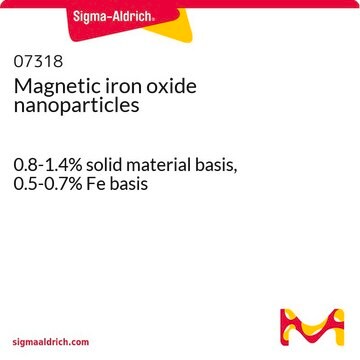747343
Iron oxide(II,III), magnetic nanoparticles solution
5 nm avg. part. size (TEM), amine functionalized, 1 mg/mL Fe in H2O, dispersion
Sinonimo/i:
Fe NP NH2, FexOy, Magnetic iron oxide nanocrystals, Magnetite, Superparamagnetic iron oxide nanoparticles
About This Item
Prodotti consigliati
Forma fisica
dispersion
nanoparticles
Concentrazione
1 mg/mL Fe in H2O
Magnetizzazione
>25 emu/g, at room temperature; under 4500 Oe
Colore
brown
Dimens. media delle particelle
5 nm (TEM)
Densità
0.997 g/mL at 25 °C
~1 g/mL at 25 °C
Gruppo funzionale
amine
Temperatura di conservazione
2-8°C
Stringa SMILE
O=[Fe].O=[Fe]O[Fe]=O
InChI
1S/3Fe.4O
SZVJSHCCFOBDDC-UHFFFAOYSA-N
Cerchi prodotti simili? Visita Guida al confronto tra prodotti
Categorie correlate
Descrizione generale
Applicazioni
Note legali
Codice della classe di stoccaggio
12 - Non Combustible Liquids
Classe di pericolosità dell'acqua (WGK)
WGK 2
Punto d’infiammabilità (°F)
Not applicable
Punto d’infiammabilità (°C)
Not applicable
Certificati d'analisi (COA)
Cerca il Certificati d'analisi (COA) digitando il numero di lotto/batch corrispondente. I numeri di lotto o di batch sono stampati sull'etichetta dei prodotti dopo la parola ‘Lotto’ o ‘Batch’.
Possiedi già questo prodotto?
I documenti relativi ai prodotti acquistati recentemente sono disponibili nell’Archivio dei documenti.
I clienti hanno visto anche
Articoli
Iron oxide nanoparticles find diverse applications in magnetic data storage, biosensing, and drug delivery due to their properties.
Professor Mitsuhiro Ebara provides insights on several types of smart nanofiber mesh systems that have been explored for different drug delivery purposes.
Prof. Yadong Yin discusses various synthesis methods of magnetite nanocrystals and their applications in different fields.
The recent emergence of a number of highly functional nanomaterials has enabled new approaches to the understanding, diagnosis, and treatment of cancer.
Il team dei nostri ricercatori vanta grande esperienza in tutte le aree della ricerca quali Life Science, scienza dei materiali, sintesi chimica, cromatografia, discipline analitiche, ecc..
Contatta l'Assistenza Tecnica.

